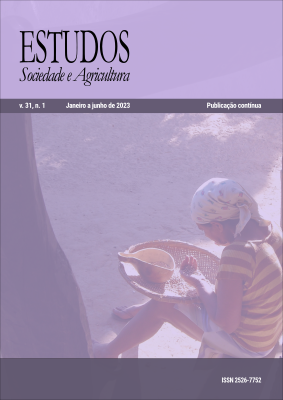Babassu palm nut breakers and new narratives opposing Matopiba in Médio Mearim, Maranhão
DOI:
https://doi.org/10.36920/esa31-1_st03Keywords:
babassu palm nut breakers, agribusiness, agroecology, feminismsAbstract
This article investigates how women who break babassu palm nuts have been impacted by the Brazilian government’s Matopiba development efforts in the Médio Mearim area of Maranhão, northeastern Brazil. The main characteristics of the agribusiness model in the region are examined together with its new form of territorialization (from expanding the agricultural frontier), along with the strategies and collective actions used by the babassu nut breakers against these projects. We utilized semi-structured interviews with leaders of the Interstate Babassu Nut Breakers Movement (Movimento Interestadual das Quebradeiras de Coco Babaçu, MIQCB) who play a prominent role in defending the territory and shaping the social and community fabric of the Médio Mearim region; specialized reports, previous studies, and audiovisual sources were also reviewed. Self-organization of women through the MIQCB has been one of their main strategies for (re)existence and collective action to combat the impacts of agribusiness on their bodies/territories and communities. The babassu nut breakers are political individuals who generate new emerging narratives through agroecology, cooperativism, food sovereignty, and rural and popular feminisms to combat increasing deforestation of babassu palms, socio-environmental conflicts, and violence in this region.
Downloads
Downloads
Published
Issue
Section
License
Copyright (c) 2023 Michelly Aragão Guimarães Costa, Laeticia Medeiros Jalil, Karina Bidaseca

This work is licensed under a Creative Commons Attribution 4.0 International License.
Authors who publish in this journal agree to the following terms:
a) Authors maintain the copyright and grant the journal the right of first publication, with the work simultaneously licensed under the Creative Commons Attribution License which allows the sharing of the work with acknowledgment of authorship and initial publication in this journal.
b) Authors are authorized to take additional contracts separately, for non-exclusive distribution of the version of the work published in this journal (eg publish in institutional repository or as a book chapter), with acknowledgment of authorship and initial publication in this journal.
c) Authors are allowed and encouraged to publish and distribute their work online (eg in institutional repositories or on their personal page) at any point before or during the editorial process, as this can generate productive changes, as well as increase the impact and citation of published work (See The Effect of Free Access).






